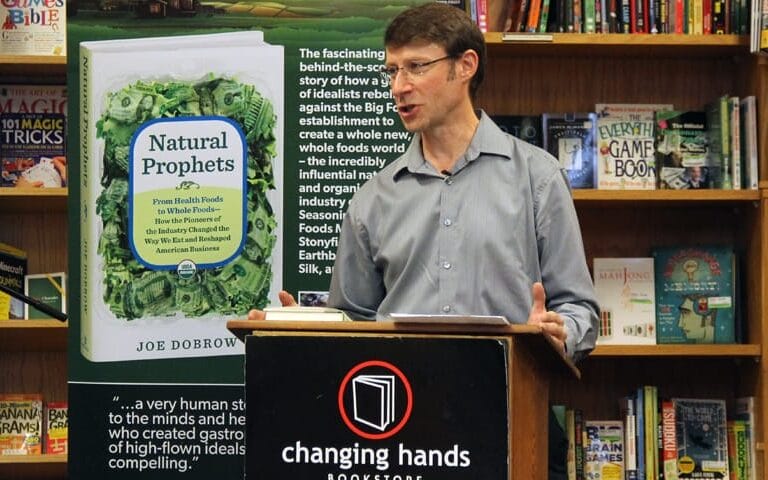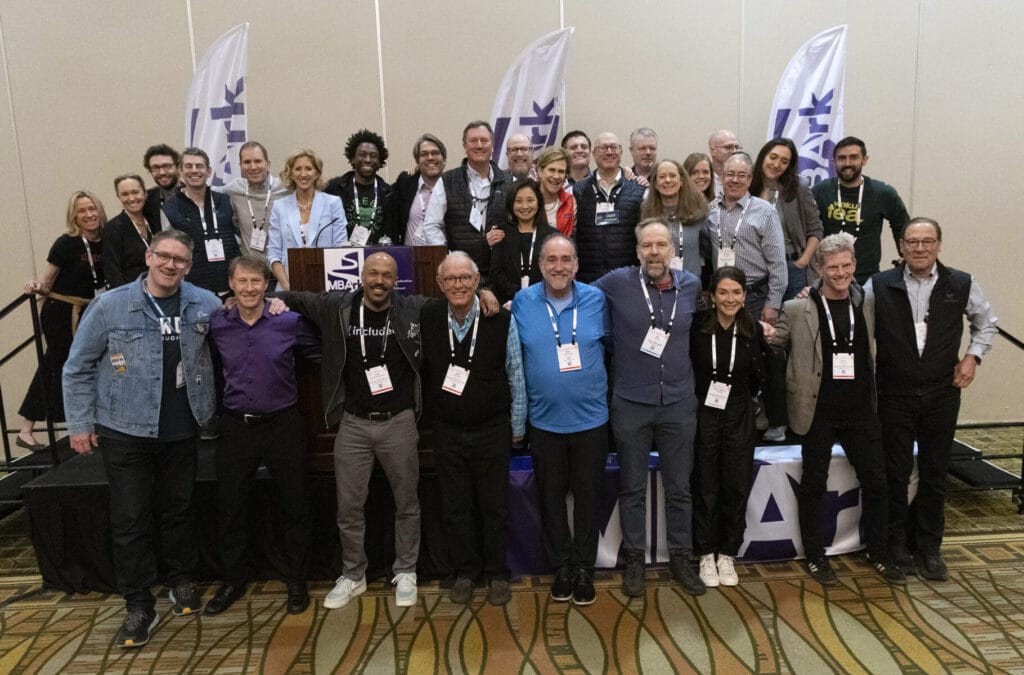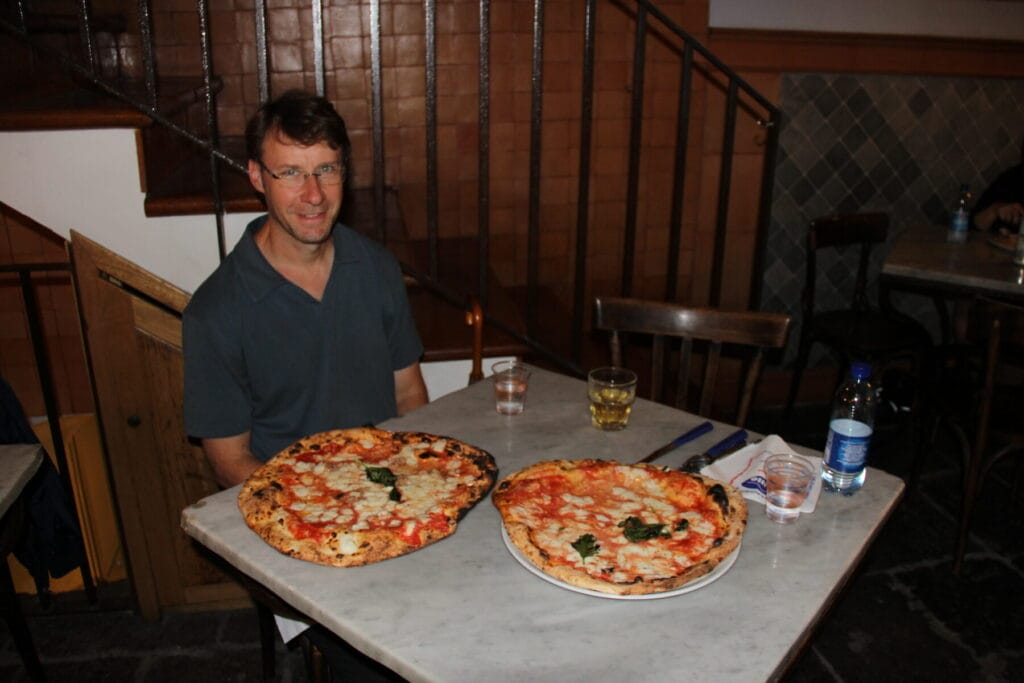
In this series, we’re meeting with Swette Center team members to explore their background in food systems, what they are currently working on, and their vision of food systems transformation.
Read on for an interview with Joe Dobrow, Professor of Practice.
When did you first get interested in food systems work?
When I was a little kid, I loved supermarkets. Every week when my mother would go shopping on Saturdays, I always wanted to go with her. Some of that was probably a little kid just wanting to get things that he wanted to eat into the house, but it was more than that. There was something about the incredible variety and the thought that these products were coming from all over the country or world. There were so many things about that aspect of life that interested me. That impulse never went away. It began to shape my eating habits. I stopped eating red meat when I was 13 and started shifting to a natural and organic diet, probably right out of college. It was hard to find those kinds of foods back then. When I went to grad school there was a tiny little health food store in New Haven that was called Edge of the Woods. I loved going there to see the new products that were coming out and see new “clean label” formulations. All of that is what sort of got me started in food systems. I came at it as a consumer, then from the industry side (as the head of marketing for Whole Foods and Sprouts), and eventually as an author and professor.
What are you working on currently?
First and foremost, I'm spending a lot of time trying to line up group capstone projects for the master of science students. I have a whole list of different organizations and companies we are pursuing. It's very familiar work for me in a lot of ways because it's similar to what I've done for years and years with the MBArk program: just trying to find food & ag companies and connect them to higher education in various ways. Part of the effort is trying to find an appropriate match with companies and organizations that are willing to support the research we're doing at the Swette Center. We want them to help train students, but at the same time, we want them to genuinely get value out of it.

I am also involved in the DC Immersive and in some marketing initiatives for the Swette Center and for the School of Sustainability.
I'm not teaching this semester, but I am going back through all the topics, all the lectures, and all the reading materials for the class I taught last semester (Managing Natural Resources for Food Production) and get that class to the point that I want it to be. I think that will make it more exciting and more integrated next fall.
I've also been asked to create a brand new class for the spring of next year. I'm in the early stages of that, and it's taking a fairly significant amount of time right now to research. Everything I'm looking at is sort of generally in my area of expertise, which is marketing. The focus could be on the packaging of food or on the data side of food marketing. It's fun to kind of have a blank slate. I’m looking around at all the other courses that are offered within ASU that are sustainability-related. I’m also looking at all the courses that are being offered by other universities in related fields. I want to understand where is there white space? Where is there demand? And hopefully, there's some intersection of those things where I can create a course that will be interesting but will also begin to cover some important new ground.
What do you think is a priority in transforming food systems?
I would say we need to continue to grow organic. How is it possible that after all the years, all the money, and all the effort, organic food sales in the US are still only about 5-7%?
As part of this, we also need to resolve what we mean by “regenerative” and figure out how it plays with organic and then adopt it fast. It took several years to get the original legislation together, and then it took 12 years between the time the Organic Foods Production Act was passed and the time it was fully implemented. We don't have the luxury of that time anymore. If it takes us 12 more years to define, adopt, and expand regenerative practices, we're in big trouble. We have to find ways to speed up the process. That leads to hard decisions. One of those is does regenerative need to have its own certification, or is part of organic certification? Or maybe a higher level of organic certification? You can make a powerful argument that if we abandon organic, if we sort of set it aside and say, “Oh, okay, now regenerative is our flavor of the month,” then we're doing a real disservice to farms, soil, animals, and farmers. Organic, while not perfect, is the best system we have and it does encompass regenerative practices. On the other hand, can we really say no if big companies like Cargill, Archer Daniels Midland, and Walmart want to invest hundreds of millions of dollars in promoting regenerative practices that are not fully certified organic - at least not yet? We have a climate emergency; can we afford to be purists? The whole field is fraught with confusion and uncertainty right now, and the climate change clock is ticking louder and faster.
Any advice for current food systems students?
Network network network network network. That’s how the food industry operates. I think there's a huge need in this industry for passionate people. Passion, in my view, is the number one prerequisite for working in the industry. It's not about specific past job experience. It’s about whether you have the fire in your belly to want to produce great food that is ultimately going to feed the masses and support planetary ecosystem health (and by the way, earning a degree in sustainable food systems is one key way to demonstrate that you have that fire). By networking, you find your way past the resume dilemma of how to find the right words to get through applicant tracking software. You find your way past the competitive market for good jobs that often results in hundreds and hundreds of applications. You appeal directly to other people who know you and who share your drive to build a more sustainable world through better, smarter food systems.
What is your favorite food to make?

I eat a lot of Italian. Sometimes I make fresh pizza, but usually, I'm just sort of constructing interesting (well, okay, boring and repetitive) meals out of pasta, protein, various seasonings, flavoring sauces, etc. I do occasionally still like to bake because I came of age with Mollie Katzen's cookbooks like Moosewood and The Enchanted Broccoli Forest. There's a ginger brandy cheesecake recipe in Moosewood and that page in my cookbook is dog-eared because I used it so many times. Then also Julee Rosso's cookbooks had some nice baked goods recipes in them. There's one recipe for cardamom coffee cake I used to make a lot. Given a couple of hours to kill and some good ingredients, that's probably what I'd be doing.